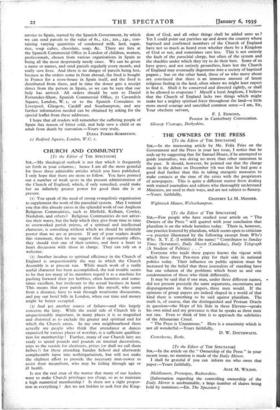CHURCH AND COMMUNITY [To the Editor of THE SPECTATOR] SIR,—My
theological outlook is not that which is frequently set forth in your columns ; hence I am all the more grateful for those three admirable articles which you have published. I only hope that there are more to follow. You have pointed out a number of weak spots in the present administration of the Church of England, which, if only remedied, could make her an infinitely greater power for good than she is at present.
(s) You speak of the need of strong evangelistic organisation to supplement the work of the parochial system. May I remind you that this already exists in the splendid work of our Anglican Religious Communities, such as Mirfield, Kelham, Cowley, Nashdom, and others ? Religious Communities do not adver- tise their wares, but the help which they give from time to time to overworked parish priests, of a spiritual and intellectual character; is something without which we should be infinitely poorer than we are at present. If any of your readers doubt this statement, then let me suggest that if opportunity offers, they should visit one of their centres, and have a heart to heart discussion with those in charge. They can rely on a welcome.
(2) Another incubus to spiritual efficiency in the Church of England is unquestionably the way in which the Church Assembly is at present run. While much work of a really useful character has been accomplished, the real trouble seems to be that too many of its members regard it as a machine for pushing forward their pet hobbies, often harmless and some- times excellent, but irrelevant to the actual business in hand. This means that poor parish priests like myself, who come from a distance, have to wait through wearisome discussions, and pay our hotel bills in London, when our time and money might be better occupied.
(3) And yet another source of failure—and this largely concerns the laity. While the social side of Church life is unquestionably important, in many places it is so magnified and distorted as to exclude the greater and spiritual end for which the Church exists. In my own neighbourhood there actually are people who think that attendance at dances organised by various places of worship, is a sufficient qualifica- tion for membership ! Further, many of our Church laity are ready to spend pounds and pounds on internal decorations, trips to the seaside for choristers, prizes (or shall we call them bribes ?) for those attending Sunday School and afterwards complacently lapse into nothingarianism, but will not make the slightest effort to provide the necessary man-power to assist their incumbent, who may be failing through age or ill health.
Is not the real crux of the matter that many of our leaders want to make Church privileges too cheap, so as to maintain a high numerical membership ? Is there not a right propor- tion in everything ? Are we not bidden to seek first the King- dom of God, and all- other things•. shall be added unto us ? Yet I could point out parishes up and down the country where baptised and confirmed members of the Church of England have not so much as heard even whether there be a Kingdom of God or not, and sometimes care less. This is not entirely the fault of the parochial clergy, but often of the system and the shackles under which they try to do their best. Some of us have grave, and not entirely groundless, fears lest the Church of England may eventually degenerate into a society of baptised pagans ; but on the other hand, those of us who move about are convinced that there is an immense amount of latent religious feeling in the land, often where we might least expect to find it. Shall it be conserved and directed rightly, or shall it be allowed to evaporate ? Myself a loyal Anglican, I believe that the Church of England lacks two things which might make her a mighty spiritual force throughout the land—a little more moral courage and sanctified common sense.—I am, Sir, Your obedient servant, F. J. EDMOND,
Proctor in Canterbury Convocation.
Glossop Vicarage, Derbyshire.










































 Previous page
Previous page